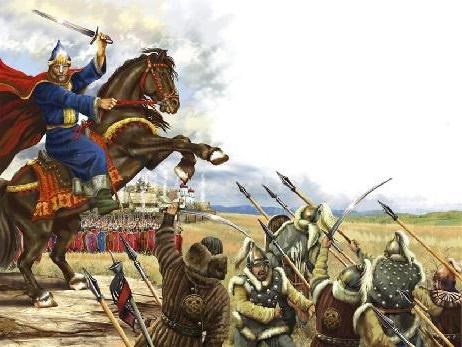Город Шарукань - половецкая столица/Sharukan is the capital of Polovtsy.
Defeat Pechenegs in 1036 on the river Setoml troops of Prince Yaroslav the Wise finally undermined the power of the nomadic tribe. To recover the Pechenegs more already failed and migrated to the lower Danube. However, their place was immediately occupied by other nomads, Torquay which are themselves oppressed more powerful tribes of the Kipchaks or Polovtsy. Coming to The black sea steppes in the middle of the XI century, Polovtsy settled here for 200 years before the arrival of the Mongol-Tatars.

Cumans (Kipchaks, Kumans), a Turkic speaking nomadic people who lived in the XII century, the entire Desht-and-Kipchak (Polovtsian steppe) from the Irtysh river to the lower reaches of the Danube. Polovtsian relationship with Russia was complicated. Polovtsy raided Russian cities, in response to Russian princes made campaigns and drove away nomads away from Russian lands. Meanwhile, between the Russian princes and Polovtsy khans dynastic marriages were concluded and princes used Polovtsy in internecine wars.
On the relationship between the Russians and Polovtsy know us ancient written sources: "the Story of the time years", "the Word on the shelf Igor" and others. So in the" Tale of bygone years " mentioned Polovtsian capital Sharukan city, which in 1111 and 1116 took the troops of Prince Vladimir Monomakh, as well as other cities, Sugrov and Balin. At first glance, it seems nonsense, because although Polovtsy were already in the second stage of migration, that is, they had constant winters, but it was not the city. Cities nomadic Cumans did not build, and in their huts they lived in tents. But the record because Sharukan clearly marked as a city, so is the historian made a mistake? In fact, settlement at the Seversky Donets and the Don existed in the time of the Khazar khanate, from the VI-VII centuries. So on the middle reaches of the Donets excavated six mounds, which existed from V to XI century, and some have lived up to the XIII-XIV centuries: Kirovskoe, Raygorodskoe, Novoselovskoe, Carino, Sidorovskoe and settlement Osinska mountain. The population of these cities was mainly Alanian origin, lived there also settled Bulgarians may was attended by Khazar element.

Probably Polovtsy having come to the Black sea steppes, have seized some Alanian city, however didn't begin to destroy it, and perhaps inhabitants of this city paid off from Polovtsy a tribute. And Polovtsian khans having chosen the area around this city for the winter season, made it their bet, that is, the capital. The city is named Sharukan, likely on behalf of one of the famous Polovtsian khans Old Sharukan, who ruled in the second half of XI - beginning of XII centuries and gave its name to the dynasty of the Polovtsian khans Sarukhanov. By the way in favor of Sharukan still Alanian origin shows and "Rawest of bygone years", in which the chronicler tells how the son of Vladimir Monomakh, Yaropolk brought from Charukala the daughter, i.e. the daughter of Yass (Alanian) Prince.

Unfortunately, historians still can't determine the location Sharukan. Scientists make various assumptions about its location, placing it near Chuguev, near Zmiev, in the area of the village of Rogan, and even on the site of Kharkov. There is also an assumption that Sharukan was near the village of Raihorodok, near Slavyansk in the Donetsk region. Whatever it was, but the capital Polovtsian Sharukan still have someone to find.
The city of Sharukan existed until the XIII century, when it was completely destroyed by the Mongol-Tatars. The population left the city and never went back.
Прошу поменять местами английский и русский тексты, в т.ч. в заголовке. Таковы правила тега #slovo
Или уберите тег во избежание флага.
С уважением.